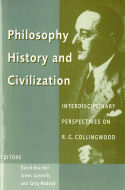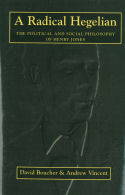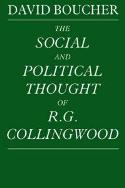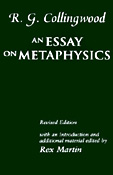Recent and forthcoming publications of the Centre, include:
Collingwood and British Idealism Studies journal
Members of the Centre produced the journal Collingwood and British Idealism Studies, the first six issues of which were published between 1994-1999 under the previous title Collingwood Studios. They included articles by such notable Collingwood scholars as Rex Martin, William H Dray and Leon J Goldstein.
Philosophy History and Civilization: Interdisciplinary Perspectives on R.G.Collingwood

(Edited by David Boucher, James Connelly & Tariq Modood)
Since his death Collingwood’s reputation as one of the twentieth century’s leading minds has gradually been growing. He has made an immense impact in the areas of philosophy of history and aesthetics, and his work in metaphysics has been closely related to that of Thomas Kuhn. More recently his work on political philosophy has come to the forefront.
He is only English-speaking philosopher to have provided a grand theory of politics in the first half of the twentieth century, and he attempted to revive the social contract tradition in political philosophy twenty-five years before Rawls. In addition to his acknowledged philosophical acumen Collingwood was the world’s leading expert on Roman inscriptions in Britain. Modern archaeologists still find considerable value in his work, especially in his attempts to apply his philosophy of history to archaeological problems.
This volume brings together leading academics from a variety of disciplines to discuss, and sometimes take issue with, Collingwood’s contributions to philosophy, aesthetics, philosophy of history, political philosophy and archaeological theory. Collingwood’s debt to Italian philosophy receives systematic consideration and the sources of his inspiration are meticulously identified.
A Radical Hegelian: The Political and Social Philosophy of Henry Jones

(By David Boucher & Andrew Vincent)
Henry Jones was an important Edwardian philosopher whose concern with the application of philosophical principles to political problems and social reform has a continuing relevance; his interest in ‘pure citizenship’ and practical Hegelianism are constant themes in his work.
In his day he had an immense reputation in Britain, Canada, Australia and the USA. He gave extensive lecture tours in the two latter countries, and, in the USA, participated in the inauguration of the Rice Institute.
He was also an active liberal and knew many of the key political figures of this period – Asquith, Lloyd George, Lord Haldane and H.A.L. Fisher amongst others. In his own country of Wales, Jones, who rose to academic eminence from a poor rural background, was something of a culture-hero and was once described as ‘in some respects the greatest living Welshman’.
This volume uses his thought as a catalyst to explore the various intricate debates at the close of the nineteenth century and the beginning of the twentieth on philosophy and metaphysics, theology and religion, evolution, citizenship and educational ideas, political ideologies, imperialism, and on the perception of events up to the First World War in the international relations theory. The book concludes with a short, personal, biographical reminiscence of Jones by his granddaughter.
The Social and Political Thought of R.G. Collingwood

(By David Boucher)
This is the first comprehensive study of the political philosophy of Collingwood, best known for his contribution to aesthetics and the philosophy of history. Collingwood’s social and political philosophy, in particular his book The New Leviathan, have been neglected, even dismissed in some quarters. Professor Boucher argues for the importance of this political theory and provides a perspicuous account of its development and originality. He contends that The New Leviathan is an attempt to reconcile philosophy and history, theory and practice. Collingwood’s distinctive contribution to modern political and social thought is seen as his sustained project of distinguishing utility from right, and right from duty; the passion for history coincides with the ethical thought because Collingwood wishes to identify dutiful, or moral, action with a historical civilisation.
Drawing on a wealth of manuscript material previously unavailable, this book will prove invaluable to political philosophers and intellectual historians.
The Correspondence of R.G. Collingwood an Illustrated Guide
(By Peter Johnson)
Collingwood, like Hume before him, disapproved of the publication of his private correspondence. Nevertheless, despite Collingwood’s wishes, it remains a fact that a significant number of letters have survived and are publicly availa
ble for inspection in university libraries, and elsewhere. Recently, this material has formed the basis for a number of important studies of his thought.
Collingwood’s correspondence is diverse in character, written in response to difference circumstances, at different dates, and for different correspondents. When viewed as a whole, Collingwood’s correspondence derives its main historical value from the evidence it provides for the more accurate dating of the composition of individual published works.
There are over 360 letters from Collingwood included in the guide. This guide is not exhaustive and other letters are certain to come to light. It is hoped that any supplementary listings will appear in future issues of Collingwood Studies.
R.G. Collingwood – An Essay on Metaphysics

(Revised edition by Rex Martin)
An Essay on Metaphysics is one of Collingwood’s finest works. First published in 1940, it is a broad-ranging work in which Collingwood considers the nature of philosophy, especially of metaphysics. He puts forward his well-known doctrine of absolute presuppositions, expounds a logic question and answer, and gives an original and influential account of causation. The book has been widely read and much discussed ever since.
In this new edition the complete original text is accompanied by three previously unpublished essays by Collingwood which will be essential reading for any serious student of his thought: ‘The Nature of Metaphysical Study’ (1934), and ‘Notes for an Essay on Logic’ (1939). These fascinating writings illuminate and amplify the ideas of the Essay, to which they are closely related. The distinguished philosopher and Collingwood scholar Rex Martin has established authoritative versions of these new texts, added a short set of notes on the Essay, and contributed a substantial introduction explaining the story of the composition of all these works, discussing their major themes, and setting them in the context of Collingwood’s philosophy as a whole.

